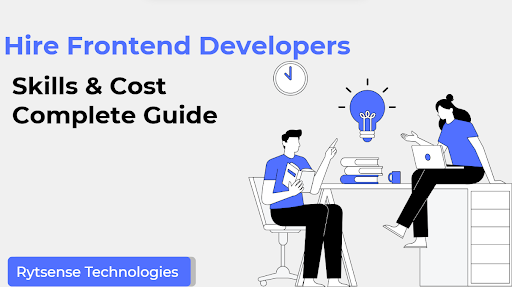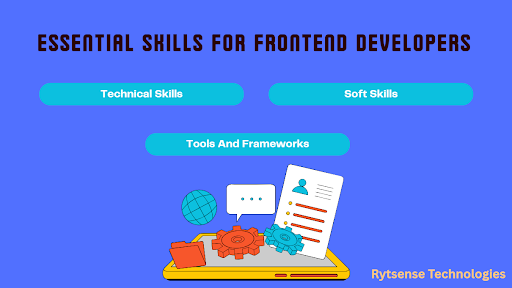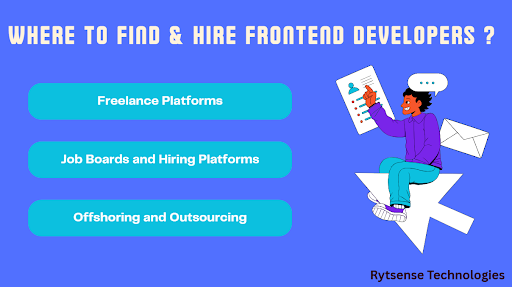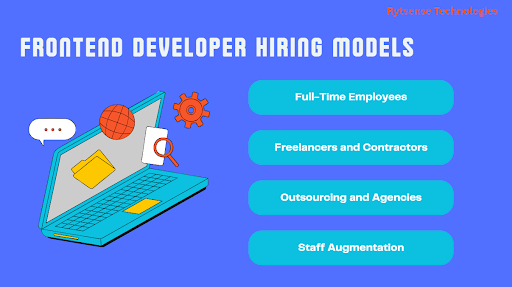Guide to Hire Frontend Developers: Skills, Cost & Where to Hire in 2025
 In the rapid-fire digital environment of 2025, the demand to
hire frontend developers
who create fast, intuitive interfaces has never been higher. Frontend Developers integrate design with functionality. They employ:
In the rapid-fire digital environment of 2025, the demand to
hire frontend developers
who create fast, intuitive interfaces has never been higher. Frontend Developers integrate design with functionality. They employ:● - HTML/CSS standards, which include the latest Grid and Flexbox features
● - Modern JavaScript, including ES6+ syntax, Promises, and async/await
● - Frameworks and libraries like Angular, React, and Vue
Additionally, they have a strong focus on pixel-perfect design, and they develop user experiences for desktop, laptop, tablet, and mobile use. Beyond coding, the ideal candidate must possess problem-solving skills, demonstrate extreme attention to detail, and possess great communication skills to provide the best working relationship with UX designers, back-end developers, and other stakeholders.
Knowing what the investment entails is crucial. In the U.S., salaries for junior frontend developers range from $45,000 to $70,000; mid-level salaries range from $70,000 to $100,000; and senior-level salaries range between $100,000 and $130,000. Freelancers typically charge between $30 and $120 per hour depending on location and specialization; companies often source through platforms like Upwork, Toptal, LinkedIn, etc. Alternatively, they may pursue offshore outsourcing vendors in India and Eastern Europe, which provides a cost-effective yet reasonably high-quality solution.
Effective hiring involves three key steps: resume and portfolio review, technical interview, and coding test.
These hiring steps can help companies secure either a full-time employee, multiple freelance contractors, or an offshore team member for long-term collaboration. A strong, diverse talent pool in Frontend development helps maintain high engagement, retention, and overall business success.
Also Read:
How much does it cost to hire AI DevelopersWhy Frontend Developers Are Essential in 2025
 Frontend developers have the responsibility to purposefully build responsive, accessible sites and applications.
In an increasingly digital world, a user is not only an audience but also a potential customer if they are first engaged and then offered a good experience.
A frontend developer’s role is to ensure that when a user engages with sites and applications, it is as smooth and delightful as it was intended.
As many organizations go this way digitally, UX design has become one of their main focuses—mostly because a smooth user experience is necessary to
reduce the chances that a user will become disengaged; a good UX keeps a person on a page and enables companies to build a following and provide value
in a crowded digital landscape.
Frontend developers have the responsibility to purposefully build responsive, accessible sites and applications.
In an increasingly digital world, a user is not only an audience but also a potential customer if they are first engaged and then offered a good experience.
A frontend developer’s role is to ensure that when a user engages with sites and applications, it is as smooth and delightful as it was intended.
As many organizations go this way digitally, UX design has become one of their main focuses—mostly because a smooth user experience is necessary to
reduce the chances that a user will become disengaged; a good UX keeps a person on a page and enables companies to build a following and provide value
in a crowded digital landscape.Frontend developers also enable organizations to strengthen their technical presence. However, as we will see later, they also help ensure that the design is clean, responsive, and accessible. Frontend developers will take the original design and, based on variations of programming languages—mainly HTML, CSS, and JavaScript—develop the original intended outcome into the final website or app. Frontend developers may also develop the customized functionality of the websites and apps they develop, while ensuring throughout that the final product works seamlessly across different devices and screen sizes.
Web and mobile applications add incredible value to organizations of all sizes. As frontend developers will need to, at a minimum, account for changes in technology, design, and user expectations related to providing applications that are engaging and functional to users, they need to make sure they are learning and developing their own skills and knowledge—particularly as the healthiest organizations and businesses will always be key competitors.
If you want to remain a competitive presence in your industry, you must hire capable frontend developers. Front-end developers are the conduit for providing businesses with a very real product that attracts, captures, engages, and retains users—a critical factor in business success. Professional front-end developers, who write clean and efficient code, help businesses produce engaging and high-quality applications. Candidates with experience in the field and familiarity with current trends should be taken into consideration when selecting a front-end developer.
Essential Skills for Frontend Developers
 In 2025, the skill set required for frontend developers is diverse and constantly evolving. Below are the key focus areas to consider when hiring frontend developers.
In 2025, the skill set required for frontend developers is diverse and constantly evolving. Below are the key focus areas to consider when hiring frontend developers.Technical Skills
Frontend development is so much more than just HTML, CSS, and JavaScript now. In 2025 frontend developers must master a broad range of technical skills. The most important qualities I would seek are:
● Modern CSS methods like Flexbox and CSS Grid, as well as semantic HTML, are crucial.
● JavaScript: Proficiency in JavaScript is essential.
● Should know ES6+ features, asynchronous JavaScript (Promises, async/await), and the DOM.
● Frontend Frameworks: Should be familiar with frameworks like React.js, Angular, or Vue.js. React.js is especially prevalent for building modern, scalable web applications.
● CSS Preprocessors: It would be helpful to be familiar with tools like Sass or LESS to help you code complex stylesheets.
● Version Control/Git: You should be familiar with version control, such as Git, GitHub, or GitLab, for collaborating with others as part of a team.
● Responsive Design: The ability to develop responsive, mobile-first websites is essential, including experience with media queries and adaptive design.
● Modern CSS methods like Flexbox and CSS Grid, as well as semantic HTML, are crucial.
● JavaScript: Proficiency in JavaScript is essential.
● Should know ES6+ features, asynchronous JavaScript (Promises, async/await), and the DOM.
● Frontend Frameworks: Should be familiar with frameworks like React.js, Angular, or Vue.js. React.js is especially prevalent for building modern, scalable web applications.
● CSS Preprocessors: It would be helpful to be familiar with tools like Sass or LESS to help you code complex stylesheets.
● Version Control/Git: You should be familiar with version control, such as Git, GitHub, or GitLab, for collaborating with others as part of a team.
● Responsive Design: The ability to develop responsive, mobile-first websites is essential, including experience with media queries and adaptive design.
Soft Skills
Although technical abilities are crucial, soft skills are equally vital. Look for frontend developers who have:
Problem-Solving: They should be adept at troubleshooting complex coding problems and identifying solutions.
Attention to detail: Frontend developers need to take care of the minutiae of their code and designs to create trustworthy and polished products.
Communication skills: Frontend developers need to be able to effectively communicate their work to non-technical stakeholders, including designers, backend developers, and project managers.
Adaptability: Frontend developers need to be adaptable because the industry is evolving rapidly, and they must be willing to try out new tools and learn new technology.
Problem-Solving: They should be adept at troubleshooting complex coding problems and identifying solutions.
Attention to detail: Frontend developers need to take care of the minutiae of their code and designs to create trustworthy and polished products.
Communication skills: Frontend developers need to be able to effectively communicate their work to non-technical stakeholders, including designers, backend developers, and project managers.
Adaptability: Frontend developers need to be adaptable because the industry is evolving rapidly, and they must be willing to try out new tools and learn new technology.
Tools and Frameworks
Just as important as technical skills, proficiency with tools and frameworks significantly impacts productivity and output quality. Some key tools or frameworks in the industry include:
Package Managers: npm or Yarn, which are used to manage dependencies in JavaScript frameworks.
Build Tools: Knowledge of Webpack, Gulp, or Parcel that performs bundling and optimizations.
Design Tools: As a frontend developer, there is more collaboration between the frontend and designers, so a sense of how to use design tools like Figma or Sketch is valuable when collaborating with a UI/UX team.
Testing Frameworks: Familiarity with testing frameworks (e.g., Jest, Mocha, and Jasmine) ensures code stability and best practices.
Package Managers: npm or Yarn, which are used to manage dependencies in JavaScript frameworks.
Build Tools: Knowledge of Webpack, Gulp, or Parcel that performs bundling and optimizations.
Design Tools: As a frontend developer, there is more collaboration between the frontend and designers, so a sense of how to use design tools like Figma or Sketch is valuable when collaborating with a UI/UX team.
Testing Frameworks: Familiarity with testing frameworks (e.g., Jest, Mocha, and Jasmine) ensures code stability and best practices.
Understanding the Cost of Hiring Frontend Developers
The pricing for hiring frontend developers depends on many factors, like experience, location, and hiring model. Clearly understanding the factors listed below will help you budget accordingly in your project.
Factors Affecting Price
Key factors include:
Experience: Junior developers will generally charge less than senior developers with a lot of experience who can work on complex projects.
Geographical location: Developers located in areas with a higher cost of living, such as the U.S. and Western Europe, will typically charge more than developers in lower-cost regions (e.g., parts of Eastern Europe or India).
Project Scope: More complex projects (with large JavaScript frameworks or integrations, etc.) will require higher price rates than simpler projects.
Salary Ranges for Frontend Developers—2025
The pay range for front-end developers in 2025 varies greatly based on expertise and region. The average salaries are:
● Junior Developers (0–2 years): $45,000 to $70,000/year (USA).
● Mid-Level Developers (2–5 years): $70,000 to $100,000/year (USA).
● Senior Developers (5+ years): $100,000 to $130,000/year (USA).
● Freelance Developers: Freelancers charge between $30 and $120 per hour, depending on experience and geography.
● Junior Developers (0–2 years): $45,000 to $70,000/year (USA).
● Mid-Level Developers (2–5 years): $70,000 to $100,000/year (USA).
● Senior Developers (5+ years): $100,000 to $130,000/year (USA).
● Freelance Developers: Freelancers charge between $30 and $120 per hour, depending on experience and geography.
Cost Breakdown by Experience and Region
Conclusion
| Experience Level | U.S. Salary (USD) | India Salary (INR) | Eastern Europe Salary (USD) |
|---|---|---|---|
| Junior (0-2 years) | $45,000 - $70,000 | INR 300,000 - 600,000 | $15 - $40 per hour |
| Mid-Level (2-5 years) | $70,000 - $100,000 | INR 700,000 - 1,500,000 | $30 - $60 per hour |
| Senior (5+ years) | $100,000 - $130,000 | INR 1,500,000 - 3,000,000 | $50 - $90 per hour |
Where to Find and Hire Frontend Developers
 When hiring a
frontend developer for your web application
or project, it’s important to know the best places to hire. Below are some of the most effective platforms to find quality frontend developer(s):
When hiring a
frontend developer for your web application
or project, it’s important to know the best places to hire. Below are some of the most effective platforms to find quality frontend developer(s):
Freelance Platforms
Job Boards and Hiring Platforms
If you're in the market for full-time frontend developers, consider using job boards and professional hiring marketplaces like LinkedIn, Indeed, and AngelList. These platforms offer access to a wide pool of candidates—from senior frontend developers to mid-level and entry-level professionals. They allow you to create job posts, review resumes, and screen applicants by skill, experience, and location.
If you're in the market for full-time frontend developers, consider using job boards and professional hiring marketplaces like LinkedIn, Indeed, and AngelList. These platforms offer access to a wide pool of candidates—from senior frontend developers to mid-level and entry-level professionals. They allow you to create job posts, review resumes, and screen applicants by skill, experience, and location.
Offshoring and Outsourcing
If you're working with a small budget or need developers skilled in specific frameworks, offshoring is a smart option.
You can hire developers from countries with lower labor costs (such as India or Eastern Europe).
Reputable platforms like Clutch and GoodFirms help you find offshore developers or
hire a development company
to build your frontend team.
These developers often provide high-quality work at lower rates compared to US or Canadian developers, without sacrificing quality. Always check their portfolio and client reviews before hiring.
As long as you understand how and where to apply these strategies, you can find frontend developers who match your technical needs, language preferences, budget, and timeline.
These developers often provide high-quality work at lower rates compared to US or Canadian developers, without sacrificing quality. Always check their portfolio and client reviews before hiring.
As long as you understand how and where to apply these strategies, you can find frontend developers who match your technical needs, language preferences, budget, and timeline.
How to Evaluate Frontend Developers Before Hiring
When it comes to hiring a frontend developer, it's essential to evaluate how well the candidate demonstrates both technical abilities and soft skills. This helps ensure you find someone well-rounded who can effectively contribute to your team and projects. Here are some effective ways to evaluate potential candidates:
Evaluate Resumes and Portfolios
Examining candidates' resumes and portfolios is the first step. Look for developers who showcase real-world project experience. A strong portfolio should include examples of websites or applications they’ve built, clearly demonstrating their frontend skills.
Also, review their GitHub repositories, code samples, or open-source contributions. This will give you insight into their coding style. Focus on clean, readable code that emphasizes maintainability—hallmarks of a skilled frontend developer.
Also, review their GitHub repositories, code samples, or open-source contributions. This will give you insight into their coding style. Focus on clean, readable code that emphasizes maintainability—hallmarks of a skilled frontend developer.
Technical Interview Questions
During the interview process, ask candidates how they approach typical frontend tasks. For example:
● How do you optimize website performance?
● What’s your experience with responsive design?
● How do you handle cross-browser compatibility issues?
These questions help you evaluate both their technical depth and their problem-solving mindset. Strong candidates should provide clear explanations and share real examples of how they’ve handled such challenges in the past.
● How do you optimize website performance?
● What’s your experience with responsive design?
● How do you handle cross-browser compatibility issues?
These questions help you evaluate both their technical depth and their problem-solving mindset. Strong candidates should provide clear explanations and share real examples of how they’ve handled such challenges in the past.
Coding Tests and Challenges
Assign coding tests or challenges to evaluate their problem-solving skills. Consider platforms like HackerRank or Codility, which offer front-end-specific coding tests. Coding tests allow candidates to demonstrate their ability to write code, debug issues, and effectively solve real-world problems, which means they provide additional opportunities, giving you insight into their practical skills.
By following these steps, you can hire front-end developers who have the necessary skills and also fit well within the team. It is extremely important that you not only assess the candidates' technical skills but also how they work with others, how they communicate, and whether they'll be able to face challenges that they may not be acquainted with.
By following these steps, you can hire front-end developers who have the necessary skills and also fit well within the team. It is extremely important that you not only assess the candidates' technical skills but also how they work with others, how they communicate, and whether they'll be able to face challenges that they may not be acquainted with.
Frontend Developer Hiring Models
 The hiring model you choose impacts how you manage your resources, costs, and project timelines.
The hiring model you choose impacts how you manage your resources, costs, and project timelines.Full-Time Employees
If you need long-term support or want someone to take ownership of their role, hiring full-time frontend developers who become part of your company is a great option. They contribute not only to your current project but also to future initiatives.
Freelancers and Contractors
Freelancers allow flexibility and can work on short-term or specific projects as needed. This is a great option for startups or companies looking for temporary or contract-based help without a long-term commitment.
Outsourcing and Agencies
Outsourcing to frontend development agencies offers access to a complete team of experts (on a fixed-cost model) along with Project Management and QA support.
Staff Augmentation
If you already have a development team in place and need to scale quickly, staff augmentation lets you add team members to your structure without full-time overhead.
Know More: Guide to Hire Node.js Developer: Skills, Salary & Freelance Options
Know More: Guide to Hire Node.js Developer: Skills, Salary & Freelance Options
The Importance of Diversity and Inclusion in Frontend Development
Having a varied team of frontend developers will enhance the web development process, creating web-based products. When we have people from different backgrounds, genders, and cultures working together, people naturally collaborate, share different perspectives, and generate innovative ideas. This is not only more interesting and engaging, but it will also help foster new opportunities for alternative ways of innovating and creating content that can be more engaging and appealing to a broader audience.
A diverse team allows you to consider more user needs when designing and developing products, increasing the chances of developing a product that can be used and enjoyed by people with different preferences and experiences because it leads to better user interfaces, inclusive design decisions, and features that appeal to a diverse audience.
To build an inclusive team, consider equitable and unbiased hiring methods. You may want to look beyond the criteria you typically look for, and you will want to seek individuals with different backgrounds. This may mean looking beyond your potentially favorite selections of one gender or culture, or even educational background. Inclusive hiring methods build equity for all candidates, help you systematically and analytically assess candidates, and create space for inclusion of all team members.
Focusing on diversity and inclusion adds depth to the development process, helps you create products that appeal to a wider audience, and improves your team's overall efficacy by making it easier to recruit creative, adaptable, and innovative thinkers for your frontend development roles.
A diverse team allows you to consider more user needs when designing and developing products, increasing the chances of developing a product that can be used and enjoyed by people with different preferences and experiences because it leads to better user interfaces, inclusive design decisions, and features that appeal to a diverse audience.
To build an inclusive team, consider equitable and unbiased hiring methods. You may want to look beyond the criteria you typically look for, and you will want to seek individuals with different backgrounds. This may mean looking beyond your potentially favorite selections of one gender or culture, or even educational background. Inclusive hiring methods build equity for all candidates, help you systematically and analytically assess candidates, and create space for inclusion of all team members.
Focusing on diversity and inclusion adds depth to the development process, helps you create products that appeal to a wider audience, and improves your team's overall efficacy by making it easier to recruit creative, adaptable, and innovative thinkers for your frontend development roles.
Mistakes to Avoid When Hiring Frontend Developers
When you hire frontend developers, there are several mistakes you should avoid if you want to ensure that you are attracting the best candidates. Here are some things to be aware of.
Avoid Overloading Job Descriptions
It can be tempting to go overboard when writing a job description and end up with a laundry list of qualifications. While listing essential skills is fine, an excessively long list may deter strong candidates. Focus on key skills like HTML, CSS, JavaScript, and modern frameworks (like React or Angular).
Overemphasizing Technical Skills Over Soft Skills
While technical knowledge is crucial, soft skills are equally important. Communication, problem-solving, collaboration, and other skills are just as critical. A developer needs to be able to work with the team, understand common goals, and communicate updates (and issues) well. A technically proficient developer who lacks communication skills can cause more problems in the long run.
Prioritizing Cost Over Quality
It's easy to hire a front-end developer with the lowest price, but doing this can result in poor results. While staying within your budget is important, hiring solely based on low cost often leads to delays and subpar results, turning into a slower process to deliver a bad end result. Once your budget is approved, stop worrying about price and concentrate on hiring based on experience, skills, and quality of work done for the best return on your investment.
When you stop making these mistakes, you are able to hire a front-end developer with the proper technical skills who also has communication and collaboration skills to use within your team.
When you stop making these mistakes, you are able to hire a front-end developer with the proper technical skills who also has communication and collaboration skills to use within your team.
How to Build an Effective Frontend Development Team
Creating a solid frontend development team starts with a strong plan. Defining roles early ensures clear expectations. This will ensure team members all understand their responsibilities and what is expected of them.
Team Success depends on collaboration. Competent front-end developers don't work in isolation. Good frontend developers are not only developers; they need to communicate with other developers, designers, and project managers to create user-friendly websites and applications. Encouraging open communication through regular feedback keeps the team aligned and prevents miscommunication.
Another important aspect is mentoring. Building a strong team has experienced developers mentoring less experienced developers in the team. This accelerates learning for junior developers and fosters a strong team culture. Mentoring will lead to the sharing of knowledge and create a stronger team overall.
Training is important as well, especially in the fast-paced world of frontend development. Frontend developers are always using more tools, languages, and techniques to develop user interfaces. Ongoing training keeps the team updated on the latest trends while also expanding their experience and knowledge base so they can continue to develop at a high level.
In conclusion, a frontend development team needs to be well-planned, have clear roles, and communicate well. By prioritizing collaboration, mentorship, and learning, you build a highly engaged team capable of delivering great products.
Team Success depends on collaboration. Competent front-end developers don't work in isolation. Good frontend developers are not only developers; they need to communicate with other developers, designers, and project managers to create user-friendly websites and applications. Encouraging open communication through regular feedback keeps the team aligned and prevents miscommunication.
Another important aspect is mentoring. Building a strong team has experienced developers mentoring less experienced developers in the team. This accelerates learning for junior developers and fosters a strong team culture. Mentoring will lead to the sharing of knowledge and create a stronger team overall.
Training is important as well, especially in the fast-paced world of frontend development. Frontend developers are always using more tools, languages, and techniques to develop user interfaces. Ongoing training keeps the team updated on the latest trends while also expanding their experience and knowledge base so they can continue to develop at a high level.
In conclusion, a frontend development team needs to be well-planned, have clear roles, and communicate well. By prioritizing collaboration, mentorship, and learning, you build a highly engaged team capable of delivering great products.
Partner with Rytsense Technologies to Build the Best Frontend Development Team
At Rytsense Technologies, we specialize in skilled frontend development teams that work hand-in-hand with your team so that you can build scalable, user-friendly applications. Whether you are looking for freelancers on a short-term basis or full-time developers for long-term initiatives, our developers will help you meet your goals.
The technology and approach our developers use to build your web applications are always current and leading-edge. At Rytsense Technologies, we ensure that the design is visually appealing, responsive, and intuitive, enabling users to complete the desired functionality. We build intuitive, engaging interfaces that enhance user experience and differentiate your business from the competition.
When you partner with us, you hire skilled developers who integrate seamlessly with your team and immediately contribute to your projects. We take time to understand your project requirements, company goals, and resources to deliver the best solutions.
For startups or established businesses, hire frontend developers from Rytsense Technologies to help ensure your projects meet deadlines, vision, and quality standards. Allow us to help you build the optimal team to realize your vision.
The technology and approach our developers use to build your web applications are always current and leading-edge. At Rytsense Technologies, we ensure that the design is visually appealing, responsive, and intuitive, enabling users to complete the desired functionality. We build intuitive, engaging interfaces that enhance user experience and differentiate your business from the competition.
When you partner with us, you hire skilled developers who integrate seamlessly with your team and immediately contribute to your projects. We take time to understand your project requirements, company goals, and resources to deliver the best solutions.
For startups or established businesses, hire frontend developers from Rytsense Technologies to help ensure your projects meet deadlines, vision, and quality standards. Allow us to help you build the optimal team to realize your vision.
Conclusion
When you decide to hire frontend developers, you will need to have an understanding of the required skills, the associated costs, and the hiring options available. Whether you choose to hire locally or from an offshore developer, you'll want to ensure that the person has solid technical skills that meet your needs, along with strong communication and teamwork skills. It is also important to be sure that the developer will fit in with your company's culture.
You can build a strong front-end development team with a clear hiring strategy and recruiting processes. This will allow you to meet your organization's objectives quickly while producing quality web applications. You will be able to find the best candidates for your frontend development team by taking the approach outlined above.
You can build a strong front-end development team with a clear hiring strategy and recruiting processes. This will allow you to meet your organization's objectives quickly while producing quality web applications. You will be able to find the best candidates for your frontend development team by taking the approach outlined above.

The Author
Karthikeyan
Co Founder, Rytsense Technologies